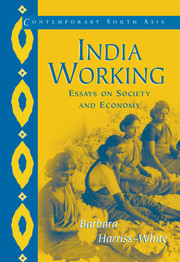Book contents
- Frontmatter
- Contents
- Preface and acknowledgments
- List of maps, figures and tables
- Glossary
- Abbreviations
- 1 Introduction: the character of the Indian economy
- 2 The workforce and its social structures
- 3 Indian development and the intermediate classes
- 4 The local State and the informal economy
- 5 Gender, family businesses and business families
- 6 India's religious pluralism and its implications for the economy
- 7 Caste and corporatist capitalism
- 8 Space and synergy
- 9 How India works
- 10 Postscript: proto-fascist politics and the economy
- Appendix 1 Liberalisation and Hindu fundamentalism
- Appendix 2 Relations between the developmental State and the intermediate classes
- Appendix 3 Roles of religious minorities in the Indian economy
- References
- Index of names
- Index of places
- Index of subjects
7 - Caste and corporatist capitalism
Published online by Cambridge University Press: 06 July 2010
- Frontmatter
- Contents
- Preface and acknowledgments
- List of maps, figures and tables
- Glossary
- Abbreviations
- 1 Introduction: the character of the Indian economy
- 2 The workforce and its social structures
- 3 Indian development and the intermediate classes
- 4 The local State and the informal economy
- 5 Gender, family businesses and business families
- 6 India's religious pluralism and its implications for the economy
- 7 Caste and corporatist capitalism
- 8 Space and synergy
- 9 How India works
- 10 Postscript: proto-fascist politics and the economy
- Appendix 1 Liberalisation and Hindu fundamentalism
- Appendix 2 Relations between the developmental State and the intermediate classes
- Appendix 3 Roles of religious minorities in the Indian economy
- References
- Index of names
- Index of places
- Index of subjects
Summary
This chapter starts out from the conclusions of the previous one. In it, the role of the ‘big religion’, and especially the role of caste, is explored further. On the one hand, caste is a force for political mobilisation as never before in Indian history. On the other hand, economic liberalisation and modernisation (by which is understood the rational organisation of economy and society) should be dissolving the economic relations based on caste. Contract should replace custom and acquired characteristics should replace ascribed ones, including caste. Many anthropologists, like most economists, believe this, and some go so far as to say it has already happened. According to Andre Béteille, for instance (1997, p. 450), among metropolitan professional people ‘caste is no longer an important agent of either placement or social control’, and in 1997 a caste association president in south India explained to us that caste is not a factor in the economy. Can the apparent contradiction between the political importance of caste and its weakening importance in the economy be resolved?
To explore this, we need to look more closely at what ‘modernisation’ is thought to entail for caste. First, it is supposed to involve an increased dissociation of castes from their hereditary occupations, as barriers to entry to occupations are dissolved and as new goods, professions, services and technologies are diffused. But under these pressures, caste reveals its ‘tremendous flexibility’ – as Jayaram (1996) calls it. Caste still screens access to employment in the agrarian non-farm economy.
- Type
- Chapter
- Information
- India WorkingEssays on Society and Economy, pp. 176 - 199Publisher: Cambridge University PressPrint publication year: 2002



